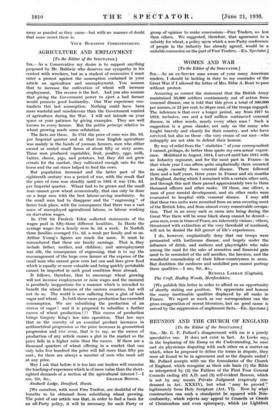REUNION AND THE CHURCH OF ENGLAND
[To the Editor of the SPECTATOR.] SIR,—Mr. G. F. Pollard's disagreement with me is a purely speculative one. It does not exist in fact. As Locke says in the beginning of his Essay on the Understanding, he once met six physicians disputing with each other on a matter on which, when he proposed to define the terms in dispute, they were all found to be in agreement and so the dispute ended ! Mr. Pollard accepts with me the formularies of the Church of England, which recognize as their sole basis (1) the Bible as interpreted by (2) the Fathers of the First Four General Councils ending 451 A.D. and (8) self-evident Reason, which is not by any means. Private Judgment (expressly con- demned in Art. XXXIV), but what " may be proved!' legitimately from Holy Scripture (Art. VI). Now, by what construction can• such .a standpoint Pe , squared with Non- conformity, which rejects any appeal to Councils 'or Creeds of Christendom and even episcopacy, which (as Lightfoot
and Swete have , proved from the Fathers' testimony in support of the New Testament) goes back to St. John's if not to St. James's days ? I do not know how Mr. Sydney Carter gets out of this.
Again, by what shift is the Holy Orthodox Church, still less the Roman Church, to be brought into Reunion with the Church of England ? The Real Presence in any sense is denied by the last rubric to the Holy Communion service as being " not here " but in heaven. Hence it labels as " idolatry " what the Roman and Eastern Churches hold. A fine beginning for Reunion ! It then proceeds in the Article XX.VIII to attack the special and essential dogma of Romp, Transubstantiation, as " overthrowing the nature of a sacra- ment," and in Art. XXXI to attack the whole system of Masses (specifically detailed in the slightly later Council of Trent's definition as their reply to this very Article and using the same language) as "blasphemous fables and dangerous deceits." Newman afterwards admitted that this was so. Indeed, the words " masses " and " blasphemous " are
repeated in the two documents as replies to each other. (Council of Trent, sees. XXII, can. iv. and viii.) Lastly, as if
to leave no stone unturned, comes the following Article :-
" As the Church of Jerusalem, Alexandria and Antioch have erred, so also the Church of Rome hath erred, not only in their living and manner of ceremonies but also in matter of faith." (Art. ix.)
After this what is left ? No angel can square this circle,
especially if angels are aware of all the historic facts and circumstances so admirably set out in Pollard's Cranmer,
in which it will be seen that Cranmer's Church (which, as the Bishop of Gloucester allows, is in no way different from that of to-day in matters of doctrine) was the conscious antithesis of the Roman Church. In reply to Bishop Gardiner, Cranmer broke up the Canon of the Mass, removed that word and the word " altar " from the whole of the service and
asked Melanchthon and Bucer and Calvin and a Lasco to help him in drawing up the new Service Books. Hence the word " Protestant " finds its way into the King's Coronation oath as a pledge of his inheritance of the throne of the house of Hanover. The word Protestant means a return to the religion of the primitive Church of the First Four General Councils and, therefore a profest (by that accident) of what the Roman Church has since added to " the faith once for all delivered to the saints" Luther used to say that he abhorred the Nonconforniists -as much as Rome, and that he thought them the sarhe thing from a different angle. This was the view of 1looker and Charles Simeon. It was certainly the view of our original Reformers and of the Church of England formu- laries. The only terms of a real Reunion would be for Non- conformity and Rome to return to the faith of the primitive









































 Previous page
Previous page